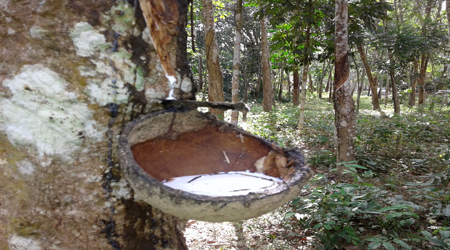The tough life of rubber planters in the Deep South
Rubber farmers in the three southernmost provinces do not just suffer from rubber price slump.

Many of them cannot venture out to tap rubber during the early hours of the morning because of the threats posed by militants. The double problem seems to have put them in worse hardship than rubber farmers in other southern provinces.
The fact that they did not join the protest early December led by rubber farmers in Nakhon Si Thammarat and SuratThani does not mean that they are contented with the condition they are experiencing.
The unrest situation and insecurity have forced many rubber planters to venture into their small plantations after sunrise to tap rubber trees. Then they will let the latex dry up in bowls made of coconut shells and will return 2-3 days afterward to collect the dried latex which is called rubber scraps.
Usually, rubber tapping takes place during the early hours of the morning when more latex can be collected. Then later on in the morning, the latex will be collected and sold in liquid form or the planters can turn them into rubber sheets which will fetch better prices than latex.
But rubber scraps fetch less price than latex or rubber sheets. The scraps are sold at 30-40 baht a kilogramme in the rest of the country but in the Deep South they fetch a little bit more than 10 baht/kg.
Because of the rock-bottom price of rubber in the Deep South, rubber planters in general were plunged into financial trouble forcing many of them to forego their pickup trucks bought on hire purchase and to force their children out of schools simply because they cannot afford the travelling expenses from home to schools or don’t have any money for their children to schools.
Life without little choices, many rubber farmers have tried out their luck in Malaysia by paying brokers who arranged for them to be smuggled into Malaysia and to work in rubber plantations there where labour who are willing to work in the plantations is scarce.
Mr Manasae, a rubber planter in Yala, is one among dozens from his neighbourhood who has just returned from working illegally in a rubber plantation in Kedah state.
In an interview with Isranews agency, Manasae said that he started to experience hardship when the price of rubber has slumped to 20 baht/kilo. To save travelling expenses, he moved his boys out of a school in the town and enrolled him at a community school which is close to home. Still, he said he had to pay 4,000 baht monthly instalment for the pickup truck that he bought.
Manasae said, at first, his family which include his wife and two children would be able to survive with 7,000 baht earning a month and to be able to pay the car instalment. But it turned out that the rubber price was so low that he could not even make 7,000 baht revenue a month. Then he decided with a group of neighbours to try their luck in Malaysia.
But life as a rubber tapper in Malaysia was nothing like home. "There, we didn’t have electricity, even our cellphones were unusable because there was no electricity to recharge the battery. We drank water from a small creek and had to play hide and seek with Malaysian border police. When the police came to plantations, we had to hide in the dark and could not use any light. Sometimes we had to escape into the mountains to escape the police," said Manasae.
Getting to the plantations to work was not easy either. Manasae said that after leaving the border checkpoint, he had to take a motorcycle for half of the journey which took about six hours and then spent a night by the jungle roadside. The next morning, they would continue the journey.
Manasae said he earned about 1,000 baht a day and after deducting all the expenses he managed to save some for his children who were left to live with his wife’s mother.
